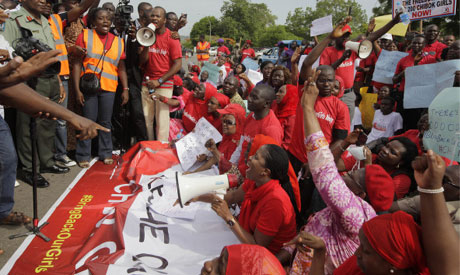
Brig. Gen. Chris Olukolade, Nigeria's top military spokesman, left, speaks to people at a demonstration calling on the government to rescue the kidnapped school girls of a government secondary school Chibok, outside the defense headquarters in Abuja, Nigeria, Tuesday May 6, 2014 (Photo: AP)
Nigeria's president said Thursday that Boko Haram's mass abduction of more than 200 schoolgirls would mark a turning point in the battle against the Islamists, as world powers joined the search to rescue the hostages.
President Goodluck Jonathan's administration has struggled to contain Boko Haram's bloody five-year uprising and experts have questioned whether Nigeria can end the violence without help.
"I believe that the kidnap of these girls will be the beginning of the end of terror in Nigeria," Jonathan told delegates at the World Economic Forum, thanking Britain, China, France and the United States for their offers of help to rescue the hostages.
The four world powers have pledged varying levels of assistance to track down the girls whose April 14 mass abduction from Chibok in northeastern Borno state has sparked global outrage.
Jonathan's comments echoed those of US President Barack Obama earlier in the week.
Obama said the Chibok kidnappings "may be the event that helps to mobilise the entire international community to finally do something against this horrendous organisation that's perpetrated such a terrible crime".
In the latest massacre by the Islamists, hundreds of peopl were killed this week in the town of Gamboru Ngala, which like Chibok is in northeastern Borno state, Boko Haram's historic stronghold.
Most of the insurgents' recent attacks have targeted the remote and deeply impoverished northeast, but two car bombings on the outskirts of the capital Abuja in the last month underscored the grave threat the Islamists pose.
Jonathan had hoped that the World Economic Forum would highlight Nigeria's economic progress and its recent emergence as Africa's top economy, but headlines have remained focused on Boko Haram.
Holding the summit in Abuja despite the recent violence amounted to victory over the extremists, the Nigerian leader said.
"You are supporting us in winning the war against terror," he told the more than 1,000 delegated from over 70 countries.
"If you had refused to come because of fear the terrorist would have jubilated," he added, saying the conference going ahead was "a major blow to the terrorists."
Nigeria has typically resisted security cooperation with the West, which analysts say has hampered efforts against the militants who have killed thousands since 2009.
American officials have acknowledged that the US military had relatively weak ties with Nigeria and unlike many other African states, the government in Abuja has shown little interest in major training programmes.
"In the past, the Nigerians have been reluctant to accept US assistance, particularly in areas having to do with security," said John Campbell, former US ambassador to Nigeria.
"Whatever assistance we might provide and might be welcomed by the Nigerian side is likely to be essentially technical," Campbell said.
Some have voiced hope that collaborating on the hostage rescue may improve Nigeria's broader capacity to defeat Boko Haram.
Washington plans to send a team of fewer than 10 military personnel as well as specialists from the Justice Department and the FBI, US officials said.
Britain said it will send experts in planning and coordination, France has offered a specialist team, while China said it would make available "any useful information acquired by its satellites and intelligence services".
As concern grew worldwide over the fate of the 223 girls being held hostage and the rescue mission ramped up, the Islamists carried out another massacre near the northeastern border with Cameroon.
After storming Gamboru Ngala in armoured vehicles after midday on Monday, the gunmen burnt traders alive in their stalls and murdered entire families.
"We have been collecting bodies from all over the town, on the streets and in burnt homes," resident Musa Abba said. "Nine members of a family were burnt alive in their home."
Area Senator Ahmed Zanna put the death toll at 300, citing information provided by locals, in an account supported by other witnesses.
Zanna said the town had been left unguarded because soldiers based there had been redeployed north towards Lake Chad in an effort to rescue the schoolgirls.
Nigeria's military has been repeatedly accused of leaving unarmed civilians to fend for themselves during the uprising, which Boko Haram says is aimed at creating an Islamic state in mainly Muslim northern Nigeria
"Some bodies are burnt beyond recognition," Babagana Goni, another resident said. "Some of the bodies were shot while others had their throats slit, which made me sick. I couldn't continue the count."
Short link: